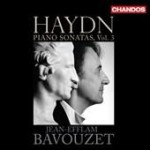If you’ve been collecting this series you won’t need any recommendation from me; if you haven’t been, you ought to start. Once again Jean-Efflam Bavouzet’s Haydn sweeps the field, at least on a modern instrument. He ornaments lavishly but always intelligently, and as before he omits codas or cadences before the second of the second-half repeats. This is such a smart and musically sensible thing to do that you can’t help but wonder if it was one of those “authentic” customs that was so obvious that no composer of the day bothered to notate or even so much as mention it.
The four sonatas on this disc have been arranged around the splendid work in C minor, one of Haydn’s greatest and most important keyboard pieces. No. 29 in E-flat major also is a grand work, with a profoundly moving central slow movement, while the two sonatas on the other side of No. 33 are lighter in character, but no less rich in invention. The entire sequence makes an ideal program for continuous listening, and Chandos’ sonics are terrific. Another great release in a standard-setting series. [10/24/2011]
































